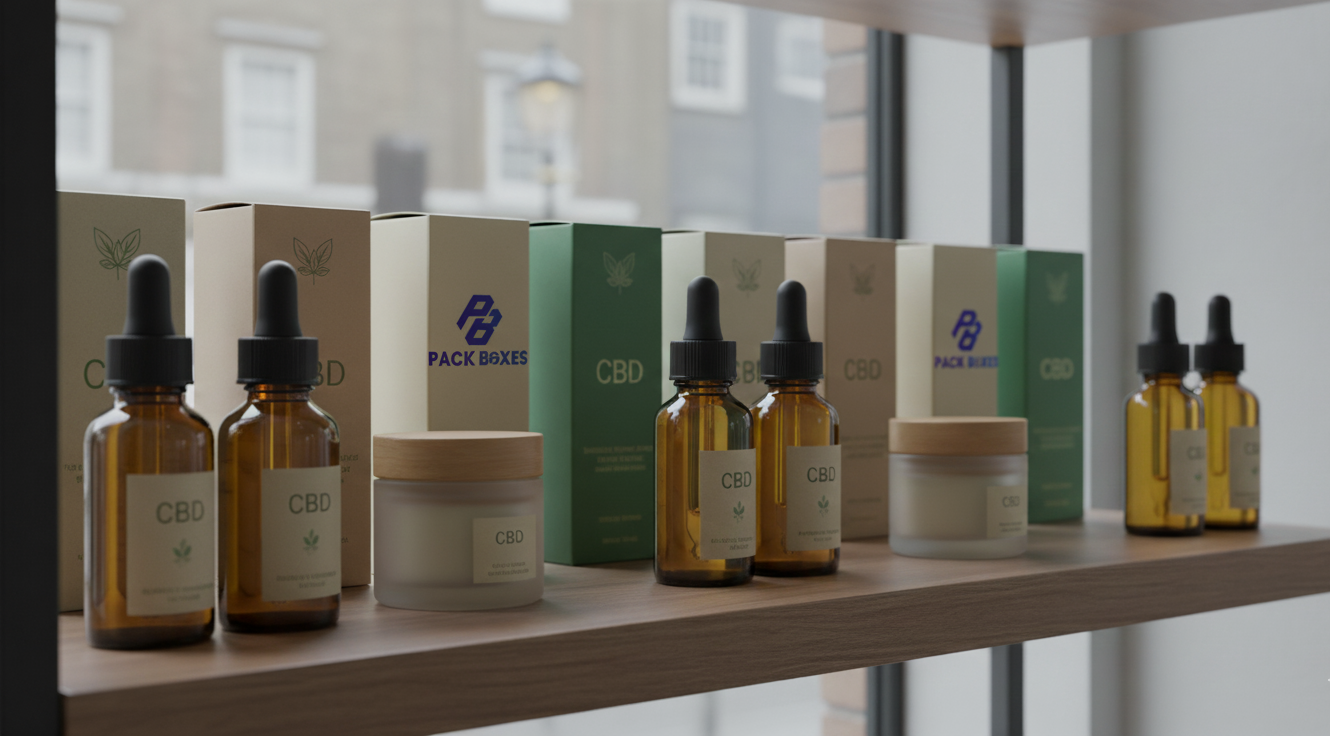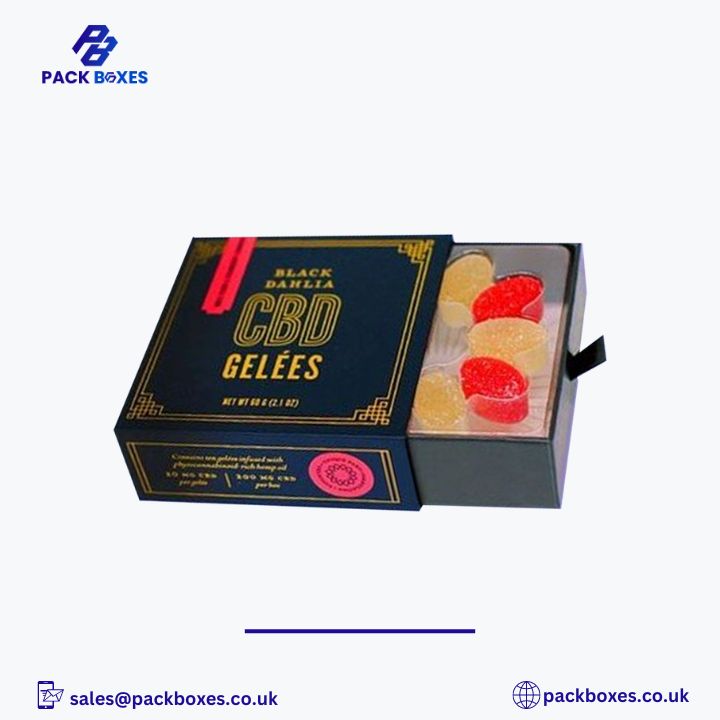Introduction
As the CBD industry continues to grow rapidly across London, UK, and beyond, proper storage has become a vital part of ensuring both product safety and customer satisfaction. CBD products—whether oils, edibles, capsules, or topicals—are sensitive to light, air, temperature, and humidity. If stored improperly, their potency and quality can quickly deteriorate, leading to a compromised customer experience and even regulatory issues for businesses.
For companies like Pack Boxes Ltd, a leader in CBD Product Packaging, understanding the science behind CBD storage is not only about protecting the product but also about creating trust and reliability in the marketplace. This article explores the best practices for CBD storage, the role of packaging, and practical strategies for both consumers and businesses.
Why CBD Storage Matters
CBD (cannabidiol) is derived from hemp plants and interacts with the body’s endocannabinoid system. Like many natural compounds, it is sensitive to external factors. Exposure to sunlight, oxygen, moisture, or high temperatures can cause CBD to degrade, reducing its effectiveness.
For businesses operating in London and other competitive markets, poor storage can lead to financial loss, unsatisfied customers, and reduced product shelf life. That’s why investing in the right storage methods and CBD Product Packaging is essential.
Key Factors That Affect CBD Shelf Life
1. Light Exposure
Ultraviolet (UV) light is one of the most damaging elements for CBD. It breaks down cannabinoids, causing them to lose potency. That’s why CBD products are often packaged in dark, opaque bottles or cartons.
2. Temperature Fluctuations
Excessive heat accelerates the breakdown of CBD. Ideally, CBD should be stored at a cool, consistent temperature (between 15°C and 25°C). Freezing is not recommended as it can change product texture.
3. Air and Oxidation
When exposed to air, CBD oxidizes. This chemical reaction reduces the effectiveness of cannabinoids. Airtight containers play a crucial role in slowing down oxidation.
4. Moisture and Humidity
Too much humidity can lead to mold growth, particularly in edibles or hemp flower products. Low-humidity, controlled environments are recommended.
The Role of Packaging in CBD Storage
For brands in London’s competitive wellness and health industry, packaging isn’t just about aesthetics—it’s about product protection.
- Barrier Protection – High-quality packaging prevents oxygen, moisture, and light from reaching the product.
- Material Selection – Glass, food-grade plastics, and eco-friendly cartons offer varying degrees of protection depending on the CBD format.
- Child-Resistant Features – In compliance with UK regulations, many CBD products require child-resistant closures to enhance safety.
- Brand Trust – Premium packaging signals quality, helping brands stand out in a saturated market.
This is why Pack Boxes Ltd emphasizes innovative CBD Product Packaging that combines compliance, protection, and branding.
Best Storage Practices for CBD
For Consumers
- Store CBD in a cool, dark cabinet away from sunlight.
- Keep the lid tightly closed after each use.
- Avoid leaving CBD products in cars, windowsills, or bathrooms where temperature and humidity fluctuate.
- Do not transfer products into non-original containers.
For Businesses
- Maintain proper warehouse conditions (temperature-controlled storage).
- Train staff on handling CBD with care.
- Rotate stock with “first in, first out” practices to ensure freshness.
- Partner with professional packaging companies that specialize in CBD compliance and protection.
CBD Storage Across Product Types
Oils and Tinctures
- Best kept in tinted glass dropper bottles.
- Must remain upright to prevent leakage.
Edibles (Gummies, Chocolates, Beverages)
- Require sealed, moisture-proof packaging.
- Often stored in refrigerated conditions for longer shelf life.
Capsules and Softgels
- Store in blister packs or opaque bottles.
- Keep away from direct sunlight.
Topicals (Balms, Creams, Lotions)
- Packaging should prevent contamination.
- Avoid heat to maintain consistency of creams.
The UK Perspective on CBD Storage
In London and across the UK, CBD is regulated under novel food and health standards. Businesses must comply with labeling, packaging, and storage guidelines set forth by the Food Standards Agency (FSA). Proper storage is not just about quality but also about regulatory compliance.
Consumers in the UK also expect transparency—clear expiration dates, usage instructions, and packaging that preserves freshness.
Future of CBD Storage and Packaging
As the industry evolves, new technologies in packaging will enhance CBD storage further. Smart packaging with QR codes, tamper-evident seals, and eco-friendly designs will become standard. Pack Boxes Ltd is actively working to integrate sustainability with function, offering packaging solutions that meet both consumer expectations and regulatory demands.
Conclusion
CBD is a sensitive compound that requires careful storage to maintain potency, safety, and consumer trust. Whether you’re a customer in London seeking long-lasting CBD oils or a business scaling operations across the UK, proper packaging and storage are non-negotiable.
With expert solutions from Pack Boxes Ltd, brands can ensure that every product delivered to customers maintains its quality and integrity—because storage is not just about preservation, it’s about delivering the promise of wellness.
FAQs
1. How long does CBD last if stored properly?
CBD products can last 12–24 months if kept away from light, heat, and air.
2. Can CBD be refrigerated?
Yes, refrigeration can extend shelf life, especially for edibles, though it may thicken oils.
3. What is the ideal temperature for CBD storage?
CBD should be stored between 15°C and 25°C for maximum freshness.
4. Why does CBD packaging often use dark glass bottles?
They block UV rays, protecting cannabinoids from light degradation.
5. Can CBD go bad?
Yes, expired CBD may lose potency and develop an unpleasant odor or taste.
6. Should CBD be stored in its original packaging?
Yes, because original packaging is designed to protect against light and air.
7. What happens if CBD is exposed to heat?
It may lose potency and its chemical structure could be altered.
8. Does humidity affect CBD edibles?
Yes, high humidity can cause mold growth in gummies or chocolates.
9. How can businesses ensure proper CBD storage?
By using climate-controlled storage facilities and compliant packaging.10. Why is packaging important for CBD in London’s market?
It ensures compliance, builds consumer trust, and protects product quality.







